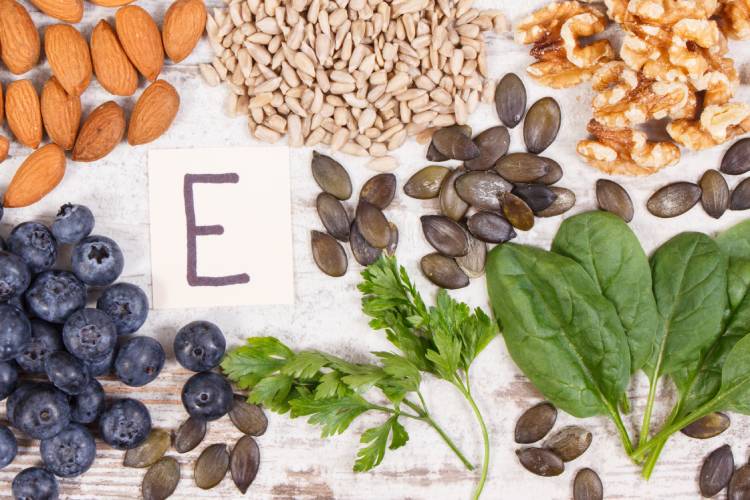Vitamin E: The Secret Weapon for Boosting Fertility in Men and Women
You may be surprised to learn that a common antioxidant found in many foods could hold the key to unlocking your fertility potential. Vitamin E, a fat-soluble vitamin found in foods such as almonds, avocados, and sweet potatoes, has been gaining attention for its potential role in boosting fertility in both men and women. Studies have suggested that vitamin E may improve sperm quality and motility in men, and protect eggs and improve ovary function in women. While more research is needed to fully understand the relationship between vitamin E and fertility, the findings so far are promising. In this article, we will take a closer look at the current research on vitamin E and fertility, and explore the potential benefits of this nutrient for those trying to conceive.
Vitamin E: The Fertility Boosting Nutrient
Vitamin E, also known as tocopherol, was first discovered in 1922 by scientists Evans and Bishop during their research on the properties of vegetable oils. They found that when rats were deficient in this substance, they experienced miscarriages or the birth of dead offspring. Further research revealed that this mysterious substance was in fact vitamin E, a fat-soluble vitamin that is essential for the normal functioning of many of the body’s systems, including the reproductive system.
It participates in the synthesis of the hormones progesterone and estrogen, necessary for maturation, fertilization, attachment of the fertilized egg, embryo retention, placenta formation. In early pregnancy, vitamin E prevents miscarriage and reduces the risk of thrombosis. Also in pregnancy, vitamin E reduces muscle tone, prevents cramps, and prevents stretch marks. That is why it was prescribed by doctors at the planning stage of pregnancy and in the early stages. Higher dosages in this case is also a moot point, since the above-mentioned daily dose of 15 mg is sufficient to perform its above-mentioned functions. However, it is important to note that more research is needed to fully understand the relationship between vitamin E and fertility, and to establish the recommended dosage of vitamin E.
Vitamin E is an antioxidant found in foods like almonds, avocados, and sweet potatoes. It is important to note that the digestibility of vitamin E can be affected by other nutrients, especially when taken with vitamin A, so it’s always important to speak with a healthcare professional before starting any supplement regimen. It is also found in foods like green vegetables, and wheat grains. Adding these foods to your diet can help to reduce the incidence of infertility.

Foods rich in vitamin E
Vitamin E can be found in a variety of foods, including vegetable oils, nuts and seeds, leafy greens, and fortified cereals. Some of the best dietary sources of vitamin E include:
- Almonds: One ounce of almonds (about 23 kernels) contains about 7.3 milligrams of vitamin E, which is about 49% of the recommended daily value (DV) for adults.
- Avocados: One medium avocado contains about 2.7 milligrams of vitamin E, which is about 18% of the DV for adults.
- Sweet potatoes: One medium sweet potato contains about 2.1 milligrams of vitamin E, which is about 14% of the DV for adults.
- Spinach: One cup of cooked spinach contains about 1.9 milligrams of vitamin E, which is about 13% of the DV for adults.
- Fortified cereals: Some fortified breakfast cereals can provide 100% or more of the DV for vitamin E in one serving.
It is important to note that vitamin E found in foods is better absorbed by the body than supplement form. Eating a balanced diet that includes a variety of foods rich in vitamin E can help ensure that you are getting enough of this important nutrient.
The World Health Organization recommends a daily intake of about 10-15 mg of the vitamin.
However, one should take into account the fact that in some conditions the need for the element increases. For example, during strenuous sports, pregnancy, lactation and old age.
Determine the daily rate for each person should a general practitioner. But as a rule, for teenagers and healthy adults it is enough to establish a diet and include in the daily diet rich in vitamin E products.
Digestibility with other nutrients
Vitamin E is a fat-soluble vitamin, which means that it is best absorbed by the body when consumed with fats. This is why many foods that are high in vitamin E, such as nuts and seeds, also contain healthy fats. Additionally, consuming vitamin E supplements with a meal that contains fat can help to enhance its absorption.
However, it’s important to note that the digestibility of vitamin E can be affected by other nutrients as well. For example, when vitamin E is taken with vitamin A, it may not be as well absorbed by the body. This is because vitamin A and vitamin E are both fat-soluble vitamins, and they compete for absorption in the body.
Read more about Vitamin A
It is also important to note that some medications can affect the absorption of vitamin E. For example, statins, which are used to lower cholesterol levels, can decrease the absorption of vitamin E. Therefore, it’s always recommended to speak with a healthcare professional before starting any supplement regimen, particularly if you are taking other medications or have any health conditions.
In conclusion, vitamin E is an essential nutrient that plays a crucial role in maintaining fertility in both men and women. It is important to consume vitamin E with other nutrients or with a meal that contains fat to ensure optimal absorption, but also to speak with a healthcare professional before starting any supplement regimen, to ensure that you are getting the right amount of vitamin E for your needs, and to avoid any negative side effects.
